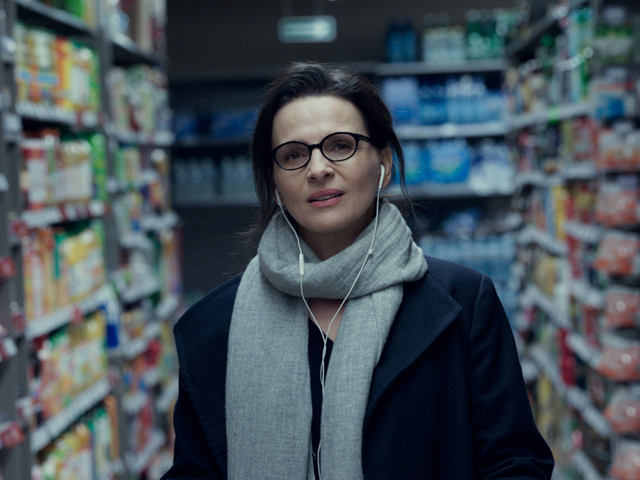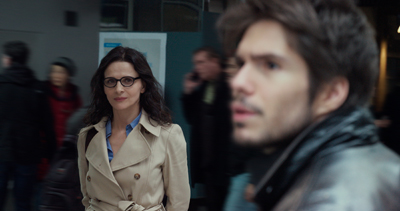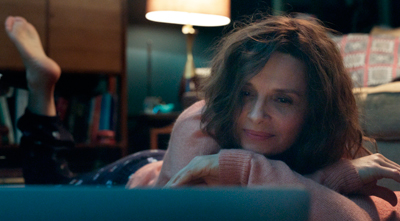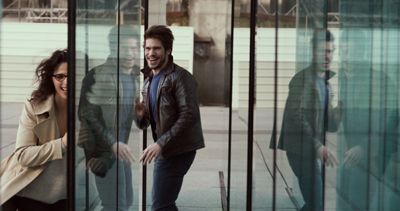Safy Nebbou Who You Think I Am Interview

Celle que vous croyez
Cast: Juliette Binoche, Nicole Garcia, François Civil
Director: Safy Nebbou
Genre: Drama
Rated: MA
Running Time: 101 minutes
Synopsis: Few films have afforded the incomparable Juliette Binoche the opportunity to showcase her remarkable range as the gripping new thriller about female desire and identity, Who You Think I Am.
Binoche plays Claire, a university lecturer and mother of two teenage boys, who is contending with the approach of middle age and remains stung by the betrayal of her ex-husband (Charles Berling), who is building a new life with another partner.
Claire has a new lover too, the handsome Ludo, but is under no illusions as to his fidelity. Out of a mix of petulance and curiosity, she impulsively creates a fake Facebook profile in which to keep an eye on him: she's 'Clara', vivacious, blonde… and 24 years old. Ludo doesn't take the bait, but his close friend Alex (François Civil) does, and their online connection soon becomes flirtatious. Titillated by the opportunity to be "young again", Claire's deceptions lead both of her identities into increasingly dangerous territory…
Based on a novel by Camille Laurens, this remarkable portrait – part psychological drama, part thriller – explores contemporary issues in an intelligent and compelling manner, and will likely spark fierce post-screening conversations. Unsurprisingly, Binoche is phenomenal.
Who You Think I Am
Release Date: August 2nd, 2019
 Interview with Safy Nebbou
Interview with Safy Nebbou
Question: Who You Think I Am is adapted from the eponymous novel by Camille Laurens. How did you discover the story?
Safy Nebbou: I discovered the novel's pitch in Gallimard's newsletter, and I instantly expressed my wish to read it before it was even published. Then I devoured it. I was thoroughly taken with the novel, and while I was reading, I immediately thought of Akira Kurosawa's film Rashomon, where everyone in turn told their version of the story. I also thought about Alfred Hitchcock's Vertigo, where James Stewart is in love with the vision of the ghost of a woman. Marivaux's False Confidences, as well as Choderlos de Laclos' Dangerous Liaisons, but also Borges and Pirandello's stories came to mind… Michel Saint Jean, my producer, was just as enthusiastic as I was. So we decided to set to work and write a screenplay. Who You Think I Am is our third film together, after Mark of an Angel [L'empreinte de l'ange] and Bad Seeds [Comme un homme].
Question: It's not your first adaptation of a literary work; Bad Seeds was based on a novel by Boileau-Narcejac, for instance. How is this one different from the others?
Safy Nebbou: The challenge was highly stimulating, as Camille Laurens' novel was both complex and inexorable, much like the structure of a clock. The fact is that it is a sequential narrative, with a first story interlinked with a second one, both revolving around an identity issue. Lying, cheating, truth, manipulation, and love: such are the delightful ingredients that carve out this narrative's maze. Beyond its romantic aspect, which makes numerous allusions to the thriller genre, it also includes a powerful societal dimension. In short, this convoluted novel with multiple entries, and told through several voices, ofered thrilling adaptation prospects for a film. After all, isn't a movie theater a place that enjoins us, for the duration of a feature film, to take fiction for reality?
Question: Though we can easily understand what tempted you from a formal standpoint, what about the content? Your film reflects a deep connection with Claire, the lonesome leading character who creates herself a fictitious online persona …
Safy Nebbou: Claire seeks to solve a conflict by becoming someone else. What touched me about her, at first, was her status as an invisible woman – emblematic for most women over the age of 50. Yet my purpose wasn't to protest outright or go for a head on, militant approach. For me, Claire is a sort of "anti-heroine," who is both complex and paradoxical. Her tragic dimension, therefore, is tinged with destructive guilt. However, she overcomes her humiliation and sorrow by expressing her life force through another, imaginary woman. Let's say that she is a distressed person, partly the victim of our society as it is today. In any case, the feeling of being past one's "prime" or rejected, in other words the awareness that time has gone by and that it can push us to the sidelines, isn't limited to women, it is universal…
Question: At any rate, you partnered with a woman, Julie Peyr, to co-write the screenplay…
Safy Nebbou: Yes, but beyond her being a woman, it was her qualities as a screenwriter that guided my choice, and her work with Arnaud Desplechin in particular (Jimmy P., My Golden Days [Trois souvenirs de ma jeunesse] and Ismaël's Ghosts [Les fantômes d'Ismaël]). Well, this said, I never imagined for a second writing this film with a man! Parity was an imperative. What is amusing is that Julie Peyr lives in Los Angeles; we therefore had to work long distance for over a year using Skype and WhatsApp. In a way, we were already immersed in the film's context!
Question: Indeed, Who You Think I Am is a rather fascinating reflection on the human – and romantic – resources offered by social media! Is this the new terrain where dangerous liaisons will henceforth be played out?
Safy Nebbou: Absolutely, though often rather less romantically so! But the expression "dangerous liaisons" is quite apropos here since Claire works as a professor of comparative literature at the university. How not to think of Laclos' text when dissecting the power play and manipulation games that have become commonplace in social media today? Under cover of the virtual world, it is easy to invent a new identity and a new life: the one we would like to live… Social networks ofer an endless number of possibilities to promote, cultivate and fuel various forms of "dangerous liaisons." Most probably, these new technologies will also spawn new pathologies…
 Question: We get the feeling that this subject is particularly close to your heart…
Question: We get the feeling that this subject is particularly close to your heart… Safy Nebbou: Yes, it is, because I too was duped by a woman on social media! A woman who was Claire's age and pretended to be younger, just like Claire. This afair, see I'm talking about an "afair," happened to me while I was writing the adaptation of Who You Think I Am. Isn't that incredible? I exchanged with this "catfish" for three months before I discovered the unpleasant truth. Like Claire, she'd used someone else's picture. I must say I drew a lot of inspiration from this experience to write the screenplay, even re-using some of my own exchanges with her.
Question: Reality is intermingled with fiction on many levels in this adventure…
Safy Nebbou: Yes, it's somewhat crazy, but also rather logical at the same time! For we could say that Claire, much like the woman who tricked me, is a screenwriter in that she writes her own life, assigning herself a role, as if she were an actress or a film director. This is where the main point of convergence with cinema, and with my film in particular, is found. Moreover, and this probably isn't entirely by chance, Who You Think I Am is the most cinematic of all my films, with a few, modest allusions to Hitchcock in the first half and to Trufaut or Sautet in the second.
Question: Also, your narrative approach is highly visual, multiplying shots of French windows, mirrors, screens…
Safy Nebbou: The film has a "genre" dimension that I'm entirely ready to acknowledge, far from naturalistic writing. You need to accept this choice to fully enter the story. We're in a symbolic, playful and metaphoric form of expression the entire time. The computer screen, for instance, aims to make us face ourselves (reflecting our own image) but also conceals reality (by immersing us in a virtual world) at the same time. The film plays with this mirror efect. In addition, the narrative constantly goes back and forth between Claire's real world and her online persona's virtual life. We specifically worked to achieve this with Gilles Porte, the director of photography, and Cyril Gomez-Mathieu, the artistic director, seeking similarities and correspondences not only in the images but also in the lighting and the pacing. This is why matching icons or screens appear continually. Also, we wanted the visual expression of everyday life to be sufused with the notion of perfection. Moreover, we favored a contemporary vision of Paris, with recent architecture and urban areas staging the body and its surrounding space in a very conscious way. I'm thinking in particular of Claire's apartment: she lives in a modern high-rise, surrounded by windows, a sort of glass box. When night falls, her reflection appears in the picture windows and her double can thus come into play… the image nearly taking on a ghostly dimension.
Question: This makes for a perfect transition to talk about Juliette Binoche, your ideal Claire/ Clara… Did you think about her right from the start?
Safy Nebbou: Right away! I thought about her while I was writing the screenplay, and when I sent it to her, she read it in 3 hours and instantly said "yes." We fined-tuned the screenplay in a simple and constructive way. Concerning the narrative, Juliette has a viewpoint that is at once all-encompassing and extremely sharp, she ceaselessly proposed ideas. I can truly talk about self-evidence between us, and trust. I could feel that there was something, beyond the story and the role that spoke to her as a woman. On set, she's a Stradivarius, yet with a rare honesty and moxie. She hasn't lost the flair of the little girl who used to play at being an actress. She is generous and never seems to fear endangering or exposing herself. She faces her age squarely; this is the reason why she is so radiant, and also why it was such an extraordinary pleasure for me to film her.
 Question: François Civil, in the role of the young deceived lover, and Nicole Garcia, playing the part of the therapist, also fill the screen with a beautiful intensity…
Question: François Civil, in the role of the young deceived lover, and Nicole Garcia, playing the part of the therapist, also fill the screen with a beautiful intensity… Safy Nebbou: François is a budding actor who is extremely talented. I wasn't really familiar with his work in a more serious register. He agreed to screen tests and he also became an obvious choice to me. He stepped into the character quite humbly and with great sensitivity. During the first half of the film, he has to express a lot of emotion through phone calls and that isn't easy at all! To create conditions as close as possible to the actual situation for Juliette and François, we shot these sequences following the film's continuity, live on the set, without their having met, and it worked quite well. As far as Nicole Garcia is concerned, this was a dream for me, for she is both an actress and a talented director, which is sadly still too rare. The fact is that her mere presence imposes her role as the therapist in the film. Yet, beyond that, she added a fragility and subtlety to the character, who gets caught up in a transfer, as this therapist becomes dysfunctional and over empathizes with her patient. I like the idea of female solidarity.
Question: The third main theme that fuels Who You Think I Am is obviously love, essentially in its fantasized form. Is it once again a matter of projection?
Safy Nebbou: Yes, it probably is… In the first half, the love between Clara and Alex is a love that is impossible and rests solely on lies. But while their bond is fictitious, it is nonetheless real. In the second part, the love between Claire and Alex exists but it is, still, fictional! I'd like to quote Antonioni, with a sentence that is also in Camille Laurens' novel: "Love is living in another person's imagination." That's it… I tried to talk about love a little, through the imaginary life of this multi-faceted woman.
Question: Could we go as far as saying, to replicate Flaubert's famous (apocryphal) phrase about Emma Bovary, that Claire is you?
Safy Nebbou: In her own way, Claire rejects the idea of passing time in refusing to renounce her desire. So yes, I do hope that Claire is me, you, all of us…
Who You Think I Am
Release Date: August 2nd, 2019
MORE



